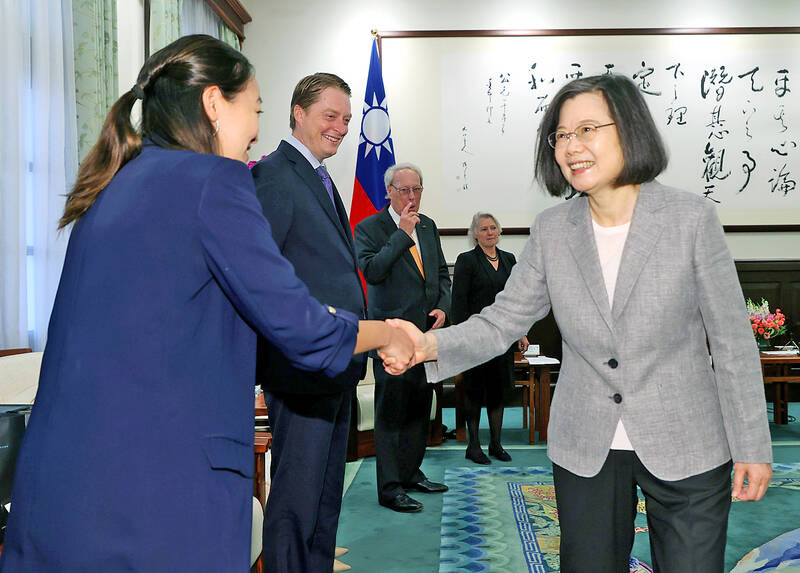Taiwan is willing and able to work with the international community to address emerging challenges, President Tsai Ing-wen (蔡英文) said during a meeting with a delegation from the National Committee on American Foreign Policy in Taipei yesterday.
Tsai thanked the New York-based organization for promoting multilateral dialogue to deepen the ties between Taiwan and the US, which has led to positive progress in regional security.
The committee also regularly publishes reports on Taiwan-US relations and the situation across the Taiwan Strait, she added.

Photo: CNA
Amid the recent turbulent international situation, Tsai believed that the delegation would be able to have a deeper understanding of the challenges Taiwan and the region are facing.
Not only have Taiwan and the US continued to strengthen their bilateral relationship, but they have also been interacting more closely with other democratic partners, she said, citing the example of a recent workshop held by the Global Cooperation and Training Framework, a platform cofounded by Taiwan and the US, with Japan and Australia later joining the partnership.
The workshop focused on maritime disaster measures, with experts on marine environment and disaster prevention from 13 countries in the Indo-Pacific region and the Caribbean participating, she said.
Taiwan will continue to strive to safeguard regional peace and stability as a responsible member of international society, as well as contribute positively to the world as a force for good, she said.
Tsai said that she was looking forward to learning about the delegation’s insights after their visits to other Asian countries, and hoped to jointly safeguard the security and sustainable development of global democracy through closer regional cooperation and dialogue.
The committee has organized a number of informal tripartite talks between experts and academics from Taipei, Beijing and the US, former US ambassador and committee president Susan Elliott said.
The best way to maintain peace, stability and prosperity is through dialogue, she said, adding that she felt honored that many experts in Taiwan were willing to exchange opinions with the delegation.
Elliott also congratulated Tsai on her “successful and fruitful” eight years in office.
In other news, a documentary on Tsai was recently released in the US and was screened at the Middleburg Film Festival in Virginia on Saturday.
The film, Invisible Nation, which took director Vanessa Hope seven years to complete, tells the story of Taiwan’s fight for democracy under threat and pressure from China, as well as the election and work of the first female president of Taiwan.
After its release at the end of last month, the film was screened at the Mill Valley Film Festival in California and the 21st New Hampshire Film Festival earlier this month.
It is to be screened at the International Documentary Film Festival Amsterdam next month, the Taipei Economic and Cultural Representative Office in the US said.

Chinese Nationalist Party (KMT) Chairman Eric Chu (朱立倫), spokeswoman Yang Chih-yu (楊智伃) and Legislator Hsieh Lung-chieh (謝龍介) would be summoned by police for questioning for leading an illegal assembly on Thursday evening last week, Minister of the Interior Liu Shyh-fang (劉世芳) said today. The three KMT officials led an assembly outside the Taipei City Prosecutors’ Office, a restricted area where public assembly is not allowed, protesting the questioning of several KMT staff and searches of KMT headquarters and offices in a recall petition forgery case. Chu, Yang and Hsieh are all suspected of contravening the Assembly and Parade Act (集會遊行法) by holding

PRAISE: Japanese visitor Takashi Kubota said the Taiwanese temple architecture images showcased in the AI Art Gallery were the most impressive displays he saw Taiwan does not have an official pavilion at the World Expo in Osaka, Japan, because of its diplomatic predicament, but the government-backed Tech World pavilion is drawing interest with its unique recreations of works by Taiwanese artists. The pavilion features an artificial intelligence (AI)-based art gallery showcasing works of famous Taiwanese artists from the Japanese colonial period using innovative technologies. Among its main simulated displays are Eastern gouache paintings by Chen Chin (陳進), Lin Yu-shan (林玉山) and Kuo Hsueh-hu (郭雪湖), who were the three young Taiwanese painters selected for the East Asian Painting exhibition in 1927. Gouache is a water-based

Taiwan would welcome the return of Honduras as a diplomatic ally if its next president decides to make such a move, Minister of Foreign Affairs Lin Chia-lung (林佳龍) said yesterday. “Of course, we would welcome Honduras if they want to restore diplomatic ties with Taiwan after their elections,” Lin said at a meeting of the legislature’s Foreign Affairs and National Defense Committee, when asked to comment on statements made by two of the three Honduran presidential candidates during the presidential campaign in the Central American country. Taiwan is paying close attention to the region as a whole in the wake of a

OFF-TARGET: More than 30,000 participants were expected to take part in the Games next month, but only 6,550 foreign and 19,400 Taiwanese athletes have registered Taipei city councilors yesterday blasted the organizers of next month’s World Masters Games over sudden timetable and venue changes, which they said have caused thousands of participants to back out of the international sporting event, among other organizational issues. They also cited visa delays and political interference by China as reasons many foreign athletes are requesting refunds for the event, to be held from May 17 to 30. Jointly organized by the Taipei and New Taipei City governments, the games have been rocked by numerous controversies since preparations began in 2020. Taipei City Councilor Lin Yen-feng (林延鳳) said yesterday that new measures by